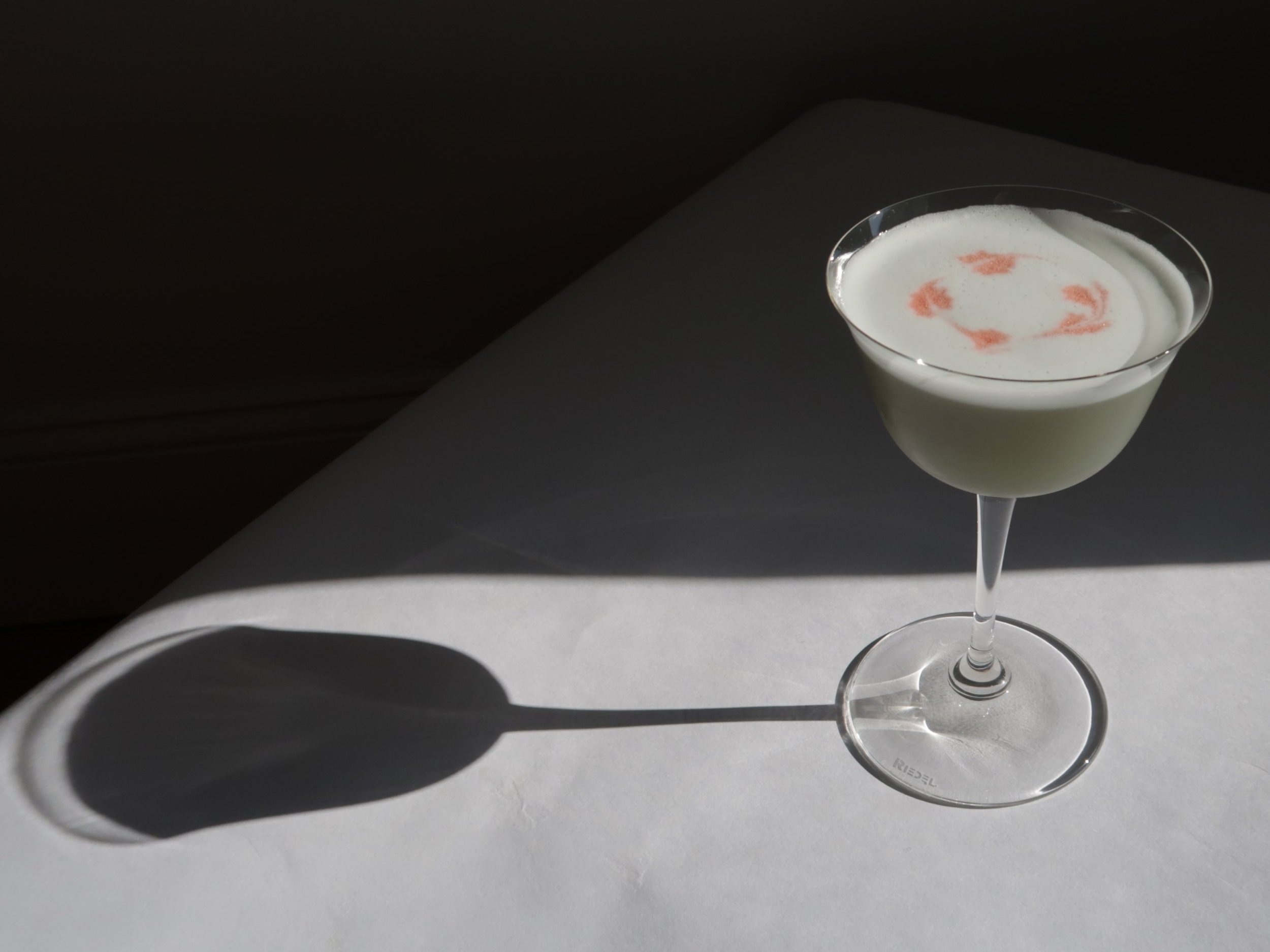Pink Lady
The Pink Lady is a drink originating in the 1910s that features a split base of dry gin and apple brandy. Most specs include egg white and some include cream. I based our version on Harry McElhone’s recipe from his ABC of Mixing Cocktails, published in London in 1922, which does include both egg white and cream. Gorgeous color, delicious, and looks so good with a bitters design on top.
Lilias and Archie’s Wedding Punch
As you know, punch is one of my favorite things to make and this one takes inspiration from a couple of nineteenth-century recipes that are lovely fruit medleys! I have always wanted to develop a recipe inspired by Punch à la Romaine for many years and, thus I have taken it as my main source recipe, especially the whipped meringue topping!
Daiquiri de Cacao
This cocktail takes the Daiquiri’s triumvirate of rum, lime and sugar and adds elements from several sours (including the Sophisticate, which was a major influence on this spec) in the Sloppy Joe’s bar manuals from the ‘30s: crème de cacao, vermouth, and egg white. I absolutely love the way this drink turned out, and it’s extra versatile because there are two garnish options: the perennial bitters design or cold weather-friendly dusting of cocoa powder.
Absinthe Suissesse
This drink name has encompassed a wide range of specs since the turn of the twentieth century, but once it settled in New Orleans, it became the drink that’s still made there today. The now-classic version has aspects of other New Orleans classics, like the Grasshopper and the Ramos Gin Fizz, and its unique combination of ingredients make it sort of like a minty eggnog. The dessert-like drink is said to be the ideal way to begin your Mardi Gras morning.
My Lady of Middlesex’s Syllabub
Syllabub is a wine- or cider-based, cream- and egg white-laced drink dating to the Elizabethan period. I added gin for a little Christmas pine flavor and opted for honey over sugar, which has a beautiful conversation with the rose, lemon, and cinnamon. Syllabub, and with its cousin posset, are often cited as predecessors to flip, eggnog, and Tom & Jerry. Over time, syllabub became more and more solid, morphing into an alcohol-laced dessert rather than a drink.
Midcentury Sour
The Whiskey Sour was one of the vestiges of nineteenth-century mixology to survive Prohibition and experience broad popularity during the postwar period. This is my take on what a really good bourbon-based sour reflective of that period should be with the iconic orange-and-cherry garnish. If you make it with vanilla syrup, it’s got a really nice, subtle creamsicle flavor; egg white advised.
Boston Sour & Rattlesnake
Whiskey Sours with egg white came into favor in the 1920s, almost certainly a product of the vibrant cocktail scene that flourished overseas during Prohibition. It has been called the Boston Sour by some, including, unsurprisingly, the Old Mr. Boston Official Bartender’s Guide, first published in the 1930s. The Rattlesnake, a Savoy Cocktail Book drink, is a Boston Sour with absinthe.
Peach Crisp Sour
This is our take on the Amaretto Sour, which was invented in the mid-1970s. The cocktail is an example of how major templates from the American cocktail canon were adapted to employ popular liqueurs of the day, especially those from Italy, like Frangelico, Galliano and various amaretto products. Our version layers peach liqueur over bourbon, amaretto, lemon, and bitters (plus optional egg white for texture), to create a sour that tastes like a peach crisp with a nutty topping.
Pink Fizz
The Fizz as a category was popular in the last few decades of the nineteenth century and the first two of the twentieth. This drink is based specifically on the Ramos Gin Fizz, which emerged in the 1880s at the Imperial Cabinet Saloon in New Orleans. Traditionally, it consists of gin, lemon and lime, sugar, orange flower water, cream, egg white, and soda. I saw an opportunity to play with the citrus, and use Aperol and banana liqueur that combine for a fruity profile, almost like creamy strawberry-banana.
Philadelphia, Mexico
I have been playing around with a tequila-based version of Philadelphia’s own Clover Club for over a year now and finally landed on this beauty. An unusual sort-of reverse dry shake technique makes the use of jam and desire for perfect egg white texture achievable.
Dream of St. Louis
An egg-and-cream-laced sour that hews pretty closely to Tom Bullock’s Dream. We’ve swapped in absinthe for the crème de menthe and, with the addition of our cordial, we’ve given the whole thing a Creamsicle, nay Dreamsicle flavor profile.
Al’s Club Fizz
Based on two great drinks of the early twentieth century ― the Elk's (Club) Fizz from the Hoffman House book and the Chicago Fizz, which made its way to the Waldorf-Astoria Bar sometime before Prohibition. In both, the basic fizz template is at play, with the great addition of some aromatized, fortified wine working in concert with aged spirit, citrus, sugar, egg white and soda.
Queen of Scots
When I was developing this drink for a potential slot on Gigantic’s 2020 spring menu (sadly reopening was postponed until 2021), I kept thinking of the nursery rhyme “Mary, Mary, Quite Contrary,” because it’s all about spring flowers and honeybees. And because I’m about 500 years old. Anyway, this song is probably about Mary Tudor, but it may also be about Mary Stuart, commonly known as the Queen of Scots, who was eventually beheaded by her cousin Elizabeth I.
Glorious Revolution
I came up with this drink while I was in Holland in October 2019. I spent a week there learning the history of genever and the current state of the industry for a story I was writing for Saveur.














